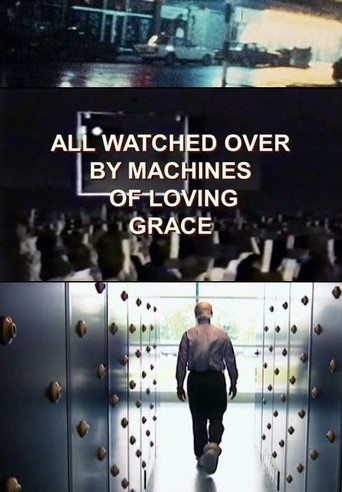All Watched Over by Machines of Loving Grace (2011)
A series of films about how humans have been colonized by the machines we have built. Although we don't realize it, the way we see everything in the world today is through the eyes of the computers.
Watch Trailer
Cast
Reviews
The film makes a home in your brain and the only cure is to see it again.
A great movie, one of the best of this year. There was a bit of confusion at one point in the plot, but nothing serious.
Although I seem to have had higher expectations than I thought, the movie is super entertaining.
Actress is magnificent and exudes a hypnotic screen presence in this affecting drama.
I generally watch documentaries based upon the topic or theme e.g. nuclear issues, language studies, ancient history, climate change and so on. Rarely do I watch one based upon the title only.This three-part examination of the relationship of computers to society is an exception: I was so intrigued by the title, having come from career of forty years in computers prior to my escape from corporate life, that I just had to see it.I wasn't disappointed. The writer/director (Adam Curtis) combines stock footage of computers, city and urban scenes, moody or discordant music, crowd scenes, famous people and a clever, cogent argument in an attempt to show the extent to which humanity has become entrapped by the IT revolution since the 1950s. It's a three part series and definitely worth every minute of your time. But, it's not only about computers...For starters, in Part 1, I could easily relate to Curtis's slant on the link between the extreme socio-economic philosophy of Ayn Rand that helped to influence Alan Greenspan's view of the world before and after various financial calamities, and up to the catastrophe of 2008. All of which was only possible – a crucially important fact – by pervasive, global computer technology used by greedy and opportunistic bankers, speculators and investors, all acting in their own self-interest.I can vouch for that, having been an insider with the online IT divisions of various banks in the UK and North America for fifteen years in the 1970s and 1980s. The standing joke in banks: you can't trust bankers. Wink, wink, nudge, nudge...Part 2 debunks the idea that nature is in equilibrium or seeks to find equilibrium. Instead, nature is in a constant state of flux and change, chaotic and unpredictable – and hence dangerous. (And, like it or not, humanity is part of nature.) This should be obvious – think of daily weather patterns globally. Curtis here links the emerging social networks as analogous to the chaos of nature which, coupled with our cancerous over-dependency upon computer technology, can only result in more unpredictability, uncertainty and opportunity for disaster. It's more than likely, I think, that Curtis is correct. To what extent, ultimately, is obviously opaque.Part 3 finishes the job in a somewhat elliptical fashion: you must follow the logic closely as we are introduced to an eminent scientist, William D. Hamilton and a brilliant mathematical genius, George R. Price. They argued that the real culprit in our chaotic existence is The Selfish Gene, a description that is now the title of Richard Dawkins's book that made him famous globally (It's an interesting, persuasive book and worth reading.) Humanity is then characterized as "soft" computer driven automata, explicitly removing the possibility of any spiritual or divine influence in human affairs.I can live with that, having decided long ago that we are all but organic machines with brains far, far superior to those "brains" of digital computers – thankfully. And the conclusion that crystallizes the essence of altruism – Ayn Rand's mortal enemy – is a tour de force of ironic tragedy.Graphically horrific images from recent depravities in Africa are interwoven to illustrate and prove the case; but it would totally spoil the finale to say anymore.Perhaps the editing of the series and some jump cutting are a mite fast at times; and the sound appears to fade occasionally. Apart from that, I highly recommend investing the three hours.Is Curtis showing us heaven on earth? See the movie. You be the judge.November 2011.
This miniseries claims to be about machines and how our use of them and misinterpretation of them has not led to the positive results we'd expected.And of course this is true. I majored in Computer Science, and yet my experiences in the "real world" developing and testing computer software have left me wondering whether this is what we, or at least I, ought to be doing, because it doesn't seem to be making anything better, and I can count the lives made worse by the software I worked on (working correctly). So I was perhaps one of the ideal viewers of this program.However, it doesn't seem to really get into the connection between computers and other machines, and the problems we've let them cause. Instead, he takes human failings, and notices that computers don't fix them, and then blames the computers and the thinking that led to them, for the original human problems. He also doesn't seem to give any credit for humans who correct past errors in thinking, which is a function of philosophy and science.The show seems to come off as fuzzily religious. The "villains" famous enough to already be known to the audience tend to be either atheist or frequent targets of religious fanatics. They are made guilty by association with genocide. It's a not-so-subtle propaganda, with the living accused not given any time to respond.Let me just say that the people who carried out the genocide carry the blame themselves. They believed foreigners who told them they were two separate people, despite their own history. They then decided it was OK to wipe each other out. Even if this idea of genocide came from the Belgians, which is unclear to me, they still accepted it and carried it out. That is their own doing, and is on them, nobody else.I've given this a score as high as 6 because I did find the stories of Ayn Rand and Africa to be interesting, aside from the rest of the content. I'll probably seek out more reliable sources to follow up on that information.
ALL WATCHED OVER MY MACHINES OF LOVING GRACE is a documentary purporting to explain the negative impact of computers and computer thinking on our society. But as this is Adam Curtis making it the result is a documentary that ranges from gorillas in the Congo to Ayn Rand rather than taking a straight A-Z. Unfortunately, in common with much of his other work, despite the sheer breadth of material covered and Curtis's undoubted skills in melding image and music, the actual argument is extremely dubious, poorly argued, lacking in evidence and frequently incoherent.Instead the documentary relies on Curtis's soothing tones (he does the v/o) and constant changes in ideas, music and images, in order to bamboozle the audience. This method of constant change prevents you thinking clearly as your attention is always being called to something else. Once the programme stops and you begin to think about it without the benefit of music, image and voice, you realise just how dodgy the whole argument is.My other usual problem is that, whenever Mr Curtis touches on a subject with which I am familiar, I usually discover he is wrong or at least generalising to a dangerous degree. Thus the entire section on the decolonisation of the Congo basically blames the Belgians and more generally the West for the near immediate collapse of that unhappy country. There is no hint that the inhabitants of the Congo could even think or act for themselves. Curtis paints a picture of local tribes living in perfect pre-European harmony (conveniently forgetting the original inhabitants of the Congo - the pygmies) that is at odds with reality. There are a large number of similar errors. My worry is that, if Curtis is so often wrong when he talks about things that I know well, then is he also wrong about the things I don't know well?The sad thing is that every poor Adam Curtis documentary is an opportunity lost. The BBC has frankly given up on even trying to make documentaries on such complex subjects (even BBC4 is more arts than intellect). And nobody else has access to such a great amount of archive or the funds to really sift through it (hence why you always see the same archive on documentaries).
An excellent series with important messages (including: an imagined potential for systems to liberate us, ended up controlling us). It's Wikipedia page is informative.Curtis brilliantly and laudably identifies grave problems. But humanity was so foolish to end up with those problems, the series left me wanting. Nothing I'll say impacts his sound theses, but it's Curtis' only series that moves me to other than praise.A primary theme of Curtis' filmography is the tragicomic consequences of ideologies imposed by elites; I love his films so I expect and embrace foolish targets. And identifying problems brings no responsibility to also solve them, particularly when identification is such an impressive contribution. But the fools gallery Curtis necessarily targets while developing the series' theses are so transparent and sterile that I believe more view through them, to depth and substance beyond, was called for. I'm so astonished that their beliefs attracted attention let alone gained currency, and the richly deserving targets are so much more delusional pushovers than in Curtis' other films, that I wanted more. (And I'm more mystified than before by how information processing enchants the analytically-challenged.) Curtis shows both the Internet and systems models fail to deliver things--that it was foolish for anyone to ever imagine they could.(Because I'm not as engaged by this series' topic as I am by Curtis' other best work, on first viewing I made large errors because it's complexity exceeded the attention I paid.) In episode one (e1) I thought Curtis drew a parallel between Ayn Rand and the Internet. On second viewing I found I was wrong. Rand and the Internet share the story in e1. And Curtis draws attention to that, such as when phrasing the belief some held that "computers would liberate us from all the old forms of political control, and we would become Randian heroes in control of our own destiny" (e1@58:17).Curtis shows the Internet couldn't do all the things some people believed it would. And he mentioned that the Internet can do some of those things, but he didn't note that those things it can do were the ones antithetical to Rand, which I think he should've given the attention he draws to Rand and the Internet in his story together, both failing fools.Curtis notes "the Internet had played a key role brought millions of people together" (e2@52:05) for revolutions in former Soviet states last decade. As we again saw during 2011's Arab Spring, in contrast to Rand's non-embrace of community, online social media's ability to manifest a collective consciousness can play an encouraging role in enabling a revolutionary wave.So while Curtis is correct that machines have not liberated us from traditional political structures, they can galvanize the action necessary to start. Thereafter OF COURSE it's up to us to organize the realization of our vision (since, as Curtis points out, "the machines offer no ideas about what comes next" {e2@58:09}). (Incidentally, Curtis' "The Century of the Self" explained that politicians today cede power to the unconscious desires of swing voters, which also deliver no organized or coherent vision forward.) Curtis notes hippie "communes {failed because they} deliberately had no hierarchy of control or authority" (e2@20:33). I lived in a 250-person alternative community of "hippies", and it ran beautifully because like most hippies and non-hippies then and always, we weren't foolish enough to think organization wasn't necessary.(OTOH, while hierarchy is often necessary, marriages can work without one spouse having authority over the other. Had communes remained small enough, and bonding been very strong, people's hearts could've done at least some of what was lacked by, and thus doomed, communes. That might suggest a way forward globally; particularly if Carpenter's 1991 "Pong" experiment {e1@9:21} demonstrated collective connection. Changing people could change politics; the Dalai Lama received an uncommon {anti-Randian} education, and he turned out pretty well; humanity should commit to universally high psychological health/development.) Foolish targets abound. E1's computer visionaries were naïve fools, and Ayn Rand's philosophy is the product of a nearly peerless psychological/emotional infant.E2 brings more idiotic beliefs, such as that inherently lossy models can faithfully reflect reality, and that disturbed ecosystems "would always try to return to an original balanced state" via a purely imaginary "underlying mechanism" (e2@5:03). It's pathetic that Forrester's systems model for the planet's ecosystem "could not imagine a future where human beings, unlike machines, would behave in ways that they hadn't before" (e2@35:35).Regarding the ecosystem model, while Curtis correctly points out it's not true, neither does it have no truth at all. There are interactions between different things in the natural world; they influence each other positively and negatively. The existence of interactions can foster a degree of stability (relative to hypotheticals with minimal interactions), albeit to an essentially dynamic reality (at all scales). The reality of interaction--for example that human actions can cause great harm--makes that part of the ecosystem model of use in understanding, and of motivational use (towards achieving optimally vital results). I think Curtis should've acknowledged these values of the ecosystem model, since they were all anyone who wasn't foolish ever thought it was really right for.{Perhaps asserting that interactions can foster some stability needs no justification. But just in case, a simple hypothetical: a habitat containing grazing animals. Too many of which might cause dramatic population decline, for example from increased risk of epidemic or from stripping the habitat; later (after the epidemic ends or the habitat recovers) the grazers' population might soar. But add to this hypothetical a different animal that preys successfully enough upon the grazing animals to lower such risks, and both the habitat and grazing animal population could gain relative stability.} The series is so densely packed that little could've been added without requiring another part, but with another part I think it could've been substantially stronger. I can't fault Curtis, but I also can't say that all that it did prevented me from feeling more was called for.




